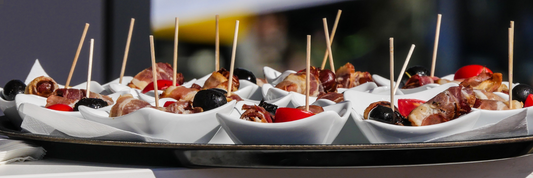Meet Kim Vu, KimEcopak Founder, a visionary entrepreneur with a mission to make the world a better place. Her passion for nature and authentic Vietnamese food led her to create an innovative eco-packaging solution that is transforming the restaurant industry. Leaving behind a successful corporate career in Saigon, Vietnam, Kim's journey to Canada was marked by challenges, but her determination to make a positive impact never wavered.
In this article, we'll dive into Kim's journey from Vietnam to Canada, the challenges she faced as a restaurant owner, and how she overcame them to create KimEcopak. We'll also discuss the impact of food-packaging on the environment and the future of eco-packaging in the restaurant industry.
Kim's Journey from Saigon to Canada started during a discovery road trip in 2018, where she fell in love with Canada's nature. Two years later, in 2020, she decided to leave her corporate job in a global firm in Saigon (Ho Chi Minh) and moved to Canada.

Kim missed Vietnamese food so much that she decided to open an authentic Vietnamese restaurant with her partner, chef Yen. The restaurant, named YenKitchen, used Canadian ingredients to create an authentic Vietnamese feeling.

I -THE CHALLENGES OF RESTAURANT OWNERSHIP
As a restaurant owner, Chef Yen & Kim faced many challenges, including:
- finding the right packaging suppliers for restaurant & managing inventory;
- dealing with high labor costs;
- complying with Covid-19 regulations;
- maintaining consistent quality; and
- balancing work and personal life.
In the following part, you will go with us to explore each of the difficulties Kim faced and how they affected her restaurant. You may find that you too are grappling with similar challenges in your own restaurant or any F&B industry.
Read on for an in-depth analysis of Kim's journey, gain valuable insights & knowing that you are not alone & how KimEcopak could help you overcome obstacles when operating your own restaurants.

#1. Finding a supplier for eco-packaging, especially for eco-packaging, while wholesale suppliers in town dealt with their customers in an unfair manner. For instance, a case of 500 pcs take-out containers that cost $100/case could increase to $170/case without any notice. Moreover, suppliers challenged Kim to go "on-the-street" for a cheaper price, arguing that their price was already good. Kim realized that this price increasing issue was a challenge not only for her restaurant but also for many restaurant owners, especially in small towns or remote areas in Canada.
Besides, managing inventory came to the 2nd difficult, due to suppliers frequently being out of stock, making it difficult to manage the restaurant's supplies.
Additionally, with small kitchen storage, Kim had to find a way to maximize space while ensuring that all supplies were available when needed. This challenge was compounded by the fact that Kim operated her restaurant in a small town, where suppliers were limited.
#2. Dealing with high labor costs: As a small business owner, Kim was responsible for managing her staff and ensuring that they were paid fairly. However, labor costs in Canada were high, making it difficult for Kim to keep her expenses in check. Moreover, recruiting and retaining qualified staff was a challenge, given the competitive labor market in her town. Kim often had to work long hours herself to compensate for the shortfall in staff.

#3. Complying with regulations: Kim had to comply with various regulations related to food safety, waste disposal, and environmental standards. Compliance with these regulations often involved significant expenses, such as purchasing specialized equipment or paying for third-party audits.
Plus, during Covid, they can only allow customer who are fully vaccinated to dine-in which lead to the fact that 50% of customer decide not going out for dine-in. Then failure to comply with regulations could result in fines, closure of the restaurant, or damage to the restaurant's reputation.

#4. Balancing work and personal life: Running a restaurant demanded long hours and commitment, leaving Kim with little time for her personal life. She often worked six or seven days a week, missing out on family events, friends gatherings, and personal time. Moreover, the pressure of running a business could be overwhelming, leaving Kim stressed and anxious.
During the pandemic, Kim had to open her restaurant seven days a week, as closing even for a day meant losing revenue while still having to pay for rent and utilities. As a result, Kim had to work between 10-12 hours per day, seven days per week, in 2020 & 2021, making it even more difficult to balance work and personal life.

#5. Maintaining consistent quality: As certified Red-Seal Chef in Canada, Chef Yen, Head Chef of YenKitchen took pride in serving high-quality food to her customers & require a strict quality control on the entire dish in the restaurant.
However, maintaining consistent quality was a daunting task that required her to source high-quality ingredients, train staffs, and invest in equipment and facilities. Moreover, unexpected events such as equipment breakdowns or staff shortages could disrupt the cooking process, leading to lower-quality food and dissatisfied customers.

II - KIMECOPAK: THE SOLUTION TO ECO-PACKAGING CHALLENGES
Kim's determination to overcome the challenges of restaurant ownership has led her to create a game-changing solution that not only benefits her but also the entire restaurant industry. With the help of her partner, Chef Yen, Kim has created an eco-friendly packaging solution that has taken the industry by storm.
By launching KimEcopak, Kim help to solve the challenges that many restaurant owners face, such as finding reliable suppliers and managing inventory. Kim's commitment to "6-month fixed price" offer has made her company stand out in the market, cementing her reputation as a savvy entrepreneur.
-----------------------------------------------------------------
Stay tuned for PART 2 of Kim's story to find out how Kim's vision and determination have transformed the restaurant industry and why KimEcopak is the preferred choice for many restaurant owners across Canada.




